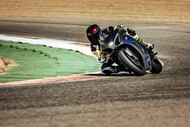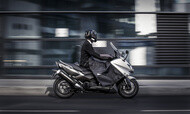
TRACK TIRES RECOMMENDED PRESSURE
SET THE RIGHT PRESSURE FOR YOUR MOTORCYCLE
 Winter
Winter

Optimum performance levels can be achieved by using the correct pressure. (*) The pressure should be set at ambient temperature and depends on the tires you have chosen to mount on your motorcycle :
Minimum cold FRONT tire pressure with tire and wheel rim at ambient temperature (**) | Minimum cold REAR tire pressure with tire and wheel rim at ambient temperature (**) | Target FRONT tire pressure when hot (after 6 laps) | Target REAR tire pressure when hot (after 6 laps) | |
30.5 PSI | 18.9 PSI | 33 PSI to 36 PSI | 23 PSI to 26 PSI | |
30.5 PSI | 18.9 PSI | 33 PSI to 36 PSI | 23 PSI to 26 PSI | |
30.5 PSI | 22 PSI | 34.8 PSI | 24.7 PSI | |
MICHELIN POWER CUP 2 (***) | 30.5 PSI | 22 PSI | 34.8 PSI | 24.7 PSI |
MICHELIN POWER CUP EVO (***) | 30.5 PSI | 22 PSI | 34.8 PSI | 24.7 PSI |
26 PSI | 23 PSI | 29 PSI | 27.5 PSI | |
- | 18.9 PSI | - | 23 PSI TO 26 PSI | |
DRY | 33 PSI | 26 PSI | - | - |
WET | 34.8 PSI | 31.9 PSI | - | - |
SOAKING WET | 34.8 PSI | 34.8 PSI | - | - |
DRY | 33 PSI | 26 PSI | - | - |
WET | 34.8 PSI | 31.9 PSI | - | - |
SOAKING WET | 34.8 PSI | 34.8 PSI | - | - |
MICHELIN POWER GP (***) | 30.5 PSI | 27.5 PSI | - | - |
Click here to see recommended pressure in BAR
Minimum cold FRONT tyre pressure with tyre and wheel rim at ambient temperature (**) | Minimum cold BACK tyre pressure with tyre and wheel rim at ambient temperature (**) | Target FRONT tyre pressure when hot (after 6 laps) | Target BACK tyre pressure when hot (after 6 laps) | |
2.1 BAR | 1.3 BAR | 2.3 BAR to 2.5 BAR | 1.6 BAR to 1.8 BAR | |
2.1 BAR | 1.3 BAR | 2.3 BAR to 2.5 BAR | 1.6 BAR to 1.8 BAR | |
2.1 BAR | 1.5 BAR | 2.4 BAR | 1.7 BAR | |
(***) | 2.1 BAR | 1.5 BAR | 2.4 BAR | 1.7 BAR |
(***) | 2.1 BAR | 1.5 BAR | 2.4 BAR | 1.7 BAR |
1.8 BAR | 1.6 BAR | 2.0 BAR | 1.9 BAR | |
- | 1.3 BAR | - | 1.6 BAR TO 1.8 BAR | |
DRYING | 2.3 BAR | 1.8 BAR | - | - |
WET | 2.4 BAR | 2.2 BAR | - | - |
SOAKING WET | 2.4 BAR | 2.4 BAR | - | - |
DRYING | 2.3 BAR | 1.8 BAR | - | - |
WET | 2.4 BAR | 2.2 BAR | - | - |
SOAKING WET | 2.4 BAR | 2.4 BAR | - | - |
(***) | 2.1 BAR | 1.9 BAR | - | - |
(*) (*) Pressure taken with tire and rim at ambient temperature, just before the first ride or just before installing the tire warmers.
(**) Michelin recommends setting the tire warmer temperature to 194°F
(***) After riding on the track and before street riding, you will need to adjust the cold tire pressure to the manufacturers’ recommended setting
For riders competing with the MICHELIN Power Performance range, Michelin’s technical teams can provide on-the-spot advice on adjusting tire pressure depending on:
MICHELIN Power Slick Evo, MICHELIN Power Cup Evo and MICHELIN Power RS tires are designed to have a short warm-up time: use of tire warmers is not mandatory.
When using tire warmers, the pressure set at ambient temperature before the first ride should be the same as without tire warmers.
Using tire warmers makes it possible to reach operating pressure more rapidly. In no cases does the use of tire warmers make it possible to start with a lower pressure. The main aim of using tire warmers is to reach the optimum operating pressure faster to save on warm-up time at the beginning of the ride.
Tire warmers should be used with temperatures of between 70°C (cold surface) and 90°C (hot surface) for at least 1 hour before the first ride.
In cold conditions, tire warmers should not be set to too high a temperature. The colder it is, the lower the temperature of the tire warmer should be in order to avoid the situation of tires cooling down while riding. Tires that cool down while riding can skew the rider’s perception of actual performance levels.
If tire warmers are used with the MICHELIN Power Rain, they should be adjusted to temperatures of between 30°C (cold surface) and 50°C (hot surface).
These pressure recommendations are given for track use. For road use, the manufacturer’s tire pressure recommendation applies. With track tires approved for the road, or road tires for occasional track use, it is essential to ensure that tire pressure is returned to the correct level for road use following use on the track.
